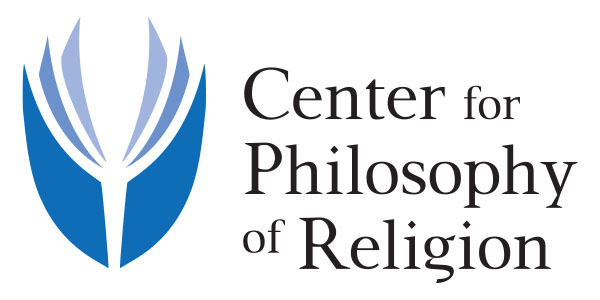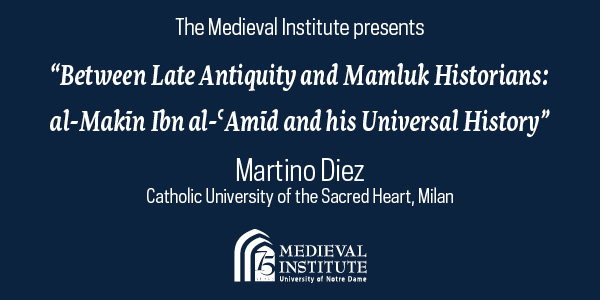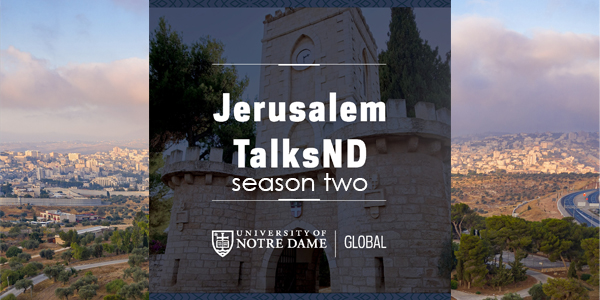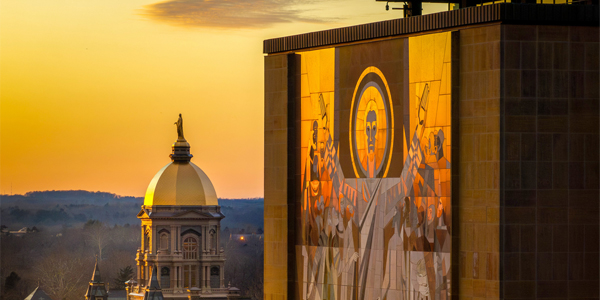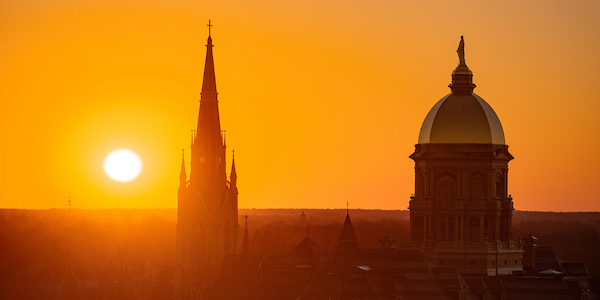Oak Flat Under Threat: the urgency of protecting this Indigenous sacred site
The Native American Law Students Association (NALSA), in collaboration with Notre Dame Law School’s Religious Liberty Initiative, hosted the event, “Sacred Lands: Apache Stronghold v. United States of America” earlier this month. The discussion, led by Professor Stephanie Barclay, centered on the importance of upholding religious liberty protections for Oak Flat, a site in Arizona that has been sacred to the Apache people for centuries and is being threatened by a massive copper mining operation.
Barclay, who serves as the faculty director of the Notre Dame Law School Religious Liberty Initiative, participated in oral argument before the en banc Ninth Circuit in Pasadena, California last March, where she represented as amici the National Congress of American Indians, an Apache tribal elder, and other groups that protect Native American cultural heritage and rights.
Apache Stronghold v. United States was one of the first cases that the Notre Dame Law School Religious Liberty Clinic supported when the Clinic was newly established in 2020. For the past three years, faculty and students from the Clinic have worked with members of the Apache tribe to protect Oak Flat.
“It is always great to learn about the ways in which the Law School supports freedom of religion, especially with regard to Native American sacred lands, which Professor Barclay explained have had the least success in legal protection,” said Katie DePaola, president of NALSA. “Part of NALSA’s mission is to educate students on Native American legal issues, and having ties to these issues through Notre Dame Law School’s Religious Liberty Initiative is very meaningful to our student organization.”
Apache Stronghold v. United States involves a proposed mining project that would turn the sacred site at Oak Flat into a massive 2-mile-wide, 1,000-foot-deep crater, ending Apache religious practices at Oak Flat forever.
At the event, Barclay spoke in depth about the Religious Freedom Restoration Act (RFRA) and its relevance to the case. RFRA establishes rights beyond those protections afforded by the Free Exercise Clause by creating a heightened standard of review for government actions that substantially burden a person’s exercise of religion.
The Religious Liberty Clinic argues that the destruction of Oak Flat constitutes a substantial burden under RFRA on Native American religious exercise, as Native American religious identity, expression, and practices are inextricably tied to the sacred land.
“Since time immemorial, [Oak Flat] has been sacred to multiple tribes including the Western Apache, and they believe it is the direct corridor to their Creator,” said Barclay. “The physical destruction the government anticipates at Oak Flat will take away any choice the Western Apache has to continue performing their religious exercise at this sacred site.”
“They face the elimination of plants, natural resources, shrines with religious significance, and religious ceremonies,” she added. “They face their places of worship being inaccessible simply because those places will cease to exist, making religious exercise physically impossible.”
Barclay also stated that, whether they are directly or indirectly affected by government actions, Native American tribes tend to be particularly vulnerable to ongoing government interference and violations of their religious liberty.
Bre Gruber, a Navajo undergraduate student at the University of Notre Dame, corroborated this and shared that the persisting challenges that Native American tribes face extend beyond the desecration and destruction of sacred lands.
“Indigeneity, whether it be the spiritual practices, language, or other cultural practices, has consistently been challenged,” said Gruber. “These challenges threaten the existence of indigeneity as it is intrinsically tied to the land, the people, and the language. These issues being discussed on the Notre Dame campus are crucial to emphasizing their importance.”
On March 1, a divided en banc Ninth Circuit issued its decision in Apache Stronghold, affirming the district court’s denial of Apache Stronghold’s motion for a preliminary injunction. The Ninth Circuit’s ruling clears the way for the destruction of Oak Flat, and Notre Dame Law School’s Religious Liberty Clinic hopes that the Supreme Court will correct it.
“Professor Barclay’s work along with the Religious Liberty Clinic student fellows is making such a strong national impact,” said Susan Azyndar, senior associate director at the Kresge Law Library. “It was moving to hear about the students’ self-reflective approach to this work and how deeply the tribes value the Clinic’s efforts.”
The event drew a diverse array of attendees from across the University. Tori Van Arsdale, an undergraduate student and tribal member of the Navajo Nation, said, “As an Indigenous student, it was uplifting to see Notre Dame Law School talk about the underrepresented issues faced in Indian Country, past and present, such as the Apache Stronghold vs. United States case. This type of Indigenous visibility is an essential tool for change in our communities.
“Here at Notre Dame, we continue to work toward Native American inclusivity in discussions across campus and beyond, and I am hopeful for change with events such as ‘Sacred Lands.’ I appreciate Notre Dame Law School for supporting the Apache and Oak Flat and for continuing to take the initiative in sharing Native American perspectives and realities.”
About the Notre Dame Law School Religious Liberty Initiative
Established in 2020, the Notre Dame Law School Religious Liberty Initiative promotes and defends religious freedom for all people through advocacy, formation, and thought-leadership. The initiative protects the freedom of individuals to hold religious beliefs as well as their right to exercise and express those beliefs and to live according to them.
The Religious Liberty Initiative has represented individuals and organizations from an array of faith traditions to defend the right to religious worship, to preserve sacred lands from destruction, to promote the freedom to select religious ministers, and to prevent discrimination against religious schools and families.
Learn more about the Religious Liberty Initiative at religiousliberty.nd.edu.
Originally published by Arienne Calingo at religiousliberty.nd.edu on March 20, 2024.
More Like This
Related PostsLet your curiosity roam! If you enjoyed the insights here, we think you might enjoy discovering the following publications.

